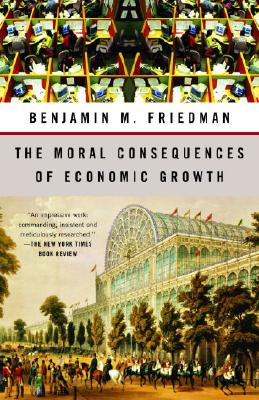

 Vintage
Vintage
The Moral Consequences of Economic Growth


Key Metrics
- Benjamin M Friedman
- Vintage
- Paperback
- 9781400095711
- 7.94 X 5.38 X 1.05 inches
- 1.06 pounds
- Business & Economics > Economics - Theory
- English
 Secure Transaction
Secure TransactionBook Description
From the author of Day of Reckoning, the acclaimed critique of Ronald Reagan's economic policy (Every citizen should read it, said The New York Times): a persuasive, wide-ranging argument that economic growth provides far more than material benefits.
In clear-cut prose, Benjamin M. Friedman examines the political and social histories of the large Western democracies-particularly of the United States since the Civil War-to demonstrate the fact that incomes on the rise lead to more open and democratic societies. He explains that growth, rather than simply a high standard of living, is key to effecting political and social liberalization in the third world, and shows that even the wealthiest of nations puts its democratic values at risk when income levels stand still. Merely being rich is no protection against a turn toward rigidity and intolerance when a country's citizens lose the sense that they are getting ahead.
With concrete policy suggestions for pursuing growth at home and promoting worldwide economic expansion, this volume is a major contribution to the ongoing debate about the effects of economic growth and globalization.
Author Bio
Benjamin M. Friedman is the William Joseph Maier Professor of Political Economy, and formerly Chairman of the Department of Economics, at Harvard University. He joined the Harvard faculty in 1972.
Mr. Friedman’s newest book, to be published by Knopf in January 2021, is Religion and the Rise of Capitalism – a fundamental reassessment of the foundations of current-day economics, showing how religious thinking has shaped economic thinking ever since the beginnings of modern Western economics and how this influence continues to be relevant today especially in the United States. His two other general interest books have been The Moral Consequences of Economic Growth (Knopf) and Day of Reckoning: The Consequences of American Economic Policy Under Reagan and After (Random House).
In addition to these works for the general public, Mr. Friedman has also written and/or edited fourteen other books, and more than 150 articles in professional journals, aimed primarily at economists and economic policymakers. Much of this work has focused on economic policy, and in particular on the role of the financial markets in shaping how monetary and fiscal policies affect overall economic activity. Specific subjects of this work have included the effects of government budget deficits, guidelines for the conduct of U.S. monetary policy, and appropriate policy actions in response to crises in a country's banking or financial system. Mr. Friedman is also a frequent contributor to publications reaching a broader audience, including especially The New York Review of Books.
Mr. Friedman's current professional activities include serving as a director of the Private Export Funding Corporation, a trustee of the Pioneer Funds, and a director of the Council for Economic Education. He was also a long-time director and member of the editorial board of the Encyclopaedia Britannica. He is a fellow of the American Academy of Arts and Sciences and a member of the Council on Foreign Relations.
Mr. Friedman received the A.B., A.M. and Ph.D. degrees in economics from Harvard University; during his graduate study at Harvard he was a Junior Fellow of the Society of Fellows. In addition, he received the M.Sc. degree in economics and politics from King's College, Cambridge (U.K.), where he studied as a Marshall Scholar. Among other distinctions, he has received the George S. Eccles Prize, awarded annually for excellence in writing about economics; the John R. Commons Award, given every two years in recognition of contributions to economics; and the Medal of the Italian Senate.
Source: Harvard University
Videos
No Videos
Community reviews
Write a ReviewNo Community reviews